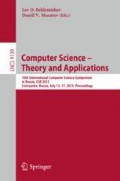Abstract
This paper describes an embedding of higher-order modal logics in the Coq proof assistant. Coq’s capabilities are used to implement modal logics in a minimalistic manner, which is nevertheless sufficient for the formalization of significant, non-trivial modal logic proofs. The elegance, flexibility and convenience of this approach, from a user perspective, are illustrated here with the successful formalization of Gödel’s ontological argument.
Christoph Benzmüller—Supported by the German Research Foundation (DFG) under grant BE 2501/9-1.
Access this chapter
Tax calculation will be finalised at checkout
Purchases are for personal use only
Notes
- 1.
- 2.
The keyword
 indicates a lambda abstraction:
indicates a lambda abstraction:  denotes the function \(\lambda x:t.p\), which takes an argument x (of type t) and returns p.
denotes the function \(\lambda x:t.p\), which takes an argument x (of type t) and returns p. - 3.
The underlying proof system of Coq (the Calculus of Inductive Constructions (CIC) [18]) is actually more sophisticated and minimalistic than the calculus shown in Fig. 1. But the calculus shown here suffices for the purposes of this paper. This calculus is classical, because of the double negation elimination rule. Although CIC is intuitionistic, it can be made classical by importing Coq ’s classical library, which adds the axiom of the excluded middle and the double negation elimination lemma.
- 4.
The ND calculus with the rules from Figs. 1 and 2 is sound and complete relatively to the calculus of Fig. 1 extended with a necessitation rule and the modal axiom K [22]. Starting from a sound and Henkin-complete ND calculus for classical higher-order logic (cf. Fig. 1), the additional modal rules in Fig. 2 make it sound and Henkin-complete for the rigid higher-order modal logic K.
- 5.
The proofs found automatically by the above provers indeed differ from the one presented here: e.g., the strong S5 principle used below (and by Scott) is not needed; the ATP proofs only rely on axiom B.
References
Benzmüller, C., Paleo, B.W.: Formalization, mechanization and automation of Gödel’s proof of god’s existence. CoRR, abs/1308.4526 (2013)
Benzmüller, C., Paleo, B.W.: Gödel’s God inIsabelle/HOL. Archive of Formal Proofs, 2013 (2013)
Benzmüller, C., Paulson, L.C.: Exploring properties of normal multimodal logics in simple type theory with LEO-II. In: Festschrift in Honor of Peter B. Andrews on His 70th Birthday, pp. 386–406. College Publications (2008)
Benzmüller, C., Paulson, L.C.: Quantified multimodal logics in simple type theory. Logica Universalis (Special Issue on Multimodal Logics) 7(1), 7–20 (2013)
Benzmüller, C.E., Paulson, L.C., Theiss, F., Fietzke, A.: LEO-II - a cooperative automatic theorem prover for classical higher-order logic (system description). In: Armando, A., Baumgartner, P., Dowek, G. (eds.) IJCAR 2008. LNCS (LNAI), vol. 5195, pp. 162–170. Springer, Heidelberg (2008)
Benzmüller, C., Brown, C.E., Kohlhase, M.: Higher-order semantics and extensionality. J. Symb. Log. 69(4), 1027–1088 (2004)
Benzmüller, C., Otten, J., Raths, T.: Implementing and evaluating provers for first-order modal logics. In: ECAI 2012–20th European Conference on Artificial Intelligence, pp. 163–168 (2012)
Blackburn, P., Benthem, J.v., Wolter, F.: Handbook of Modal Logic. Elsevier, Amsterdam (2006)
Brown, C.E.: Satallax: an automatic higher-order prover. In: Gramlich, B., Miller, D., Sattler, U. (eds.) IJCAR 2012. LNCS, vol. 7364, pp. 111–117. Springer, Heidelberg (2012)
Corazzon, R.: Contemporary bibliography on the ontological proof. (http://www.ontology.co/biblio/ontological-proof-contemporary-biblio.htm)
Fitting, M.: Types, Tableaux and Gödel’s God. Kluver Academic Press, Dordrecht (2002)
Gabbay, D.M.: Labelled Deductive Systems. Clarendon Press, Oxford (1996)
Gödel, K.: Ontological proof. In: Gödel, K.: Collected Works, Unpublished Essays and Letters. vol. 3, pp. 403–404. Oxford University Press, Oxford (1970)
Harrison, J.: HOL light: an overview. In: Berghofer, S., Nipkow, T., Urban, C., Wenzel, M. (eds.) TPHOLs 2009. LNCS, vol. 5674, pp. 60–66. Springer, Heidelberg (2009)
Nipkow, T., Paulson, L.C., Wenzel, M. (eds.): Isabelle/HOL. LNCS, vol. 2283. Springer, Heidelberg (2002)
Oppenheimer, P.E., Zalta, E.N.: A computationally-discovered simplification of the ontological argument. Australas. J. Philos. 2(89), 333–349 (2011)
Paleo, B.W., Benzmüller, C.: Formal theology repository. (http://github.com/FormalTheology/GoedelGod)
Paulin-Mohring, C.: Introduction to the calculus of inductive constructions. In: Delahaye, D., Paleo, B.W. (eds.) All about Proofs, Proofs for All. Mathematical Logic and Foundations. College Publications, London (2015)
Rushby, J.: The ontological argument in PVS. In: Proceedings of CAV Workshop Fun With Formal Methods, St. Petersburg, Russia (2013)
Schmidt, R.: List of modal provers. (http://www.cs.man.ac.uk/ schmidt/tools/)
Scott, D.: Appendix B. Notes in Dana Scott’s hand. In: [24] (2004)
Siders, A., Paleo, B.W.: A variant of Gödel’s ontological proof in a natural deduction calculus. (http://github.com/FormalTheology/GoedelGod/blob/master/Papers/InProgress/Natu ralDeduction/GodProof-ND.pdf?raw=true)
Sobel, J.H.: Gödel’s ontological proof. In: On Being and Saying. Essays for Richard Cartwright, pp. 241–261. MIT Press, Cambridge (1987)
Sobel, J.H.: Logic and Theism: Arguments for and Against Beliefs in God. Cambridge University Press, Cambridge (2004)
Acknowledgements
We thank Cedric Auger and Laurent Théry, for their answers to our questions about Ltac in the Coq-Club mailing-list.
Author information
Authors and Affiliations
Corresponding author
Editor information
Editors and Affiliations
Rights and permissions
Copyright information
© 2015 Springer International Publishing Switzerland
About this paper
Cite this paper
Benzmüller, C., Woltzenlogel Paleo, B. (2015). Interacting with Modal Logics in the Coq Proof Assistant. In: Beklemishev, L., Musatov, D. (eds) Computer Science -- Theory and Applications. CSR 2015. Lecture Notes in Computer Science(), vol 9139. Springer, Cham. https://doi.org/10.1007/978-3-319-20297-6_25
Download citation
DOI: https://doi.org/10.1007/978-3-319-20297-6_25
Published:
Publisher Name: Springer, Cham
Print ISBN: 978-3-319-20296-9
Online ISBN: 978-3-319-20297-6
eBook Packages: Computer ScienceComputer Science (R0)


 indicates a lambda abstraction:
indicates a lambda abstraction:  denotes the function
denotes the function